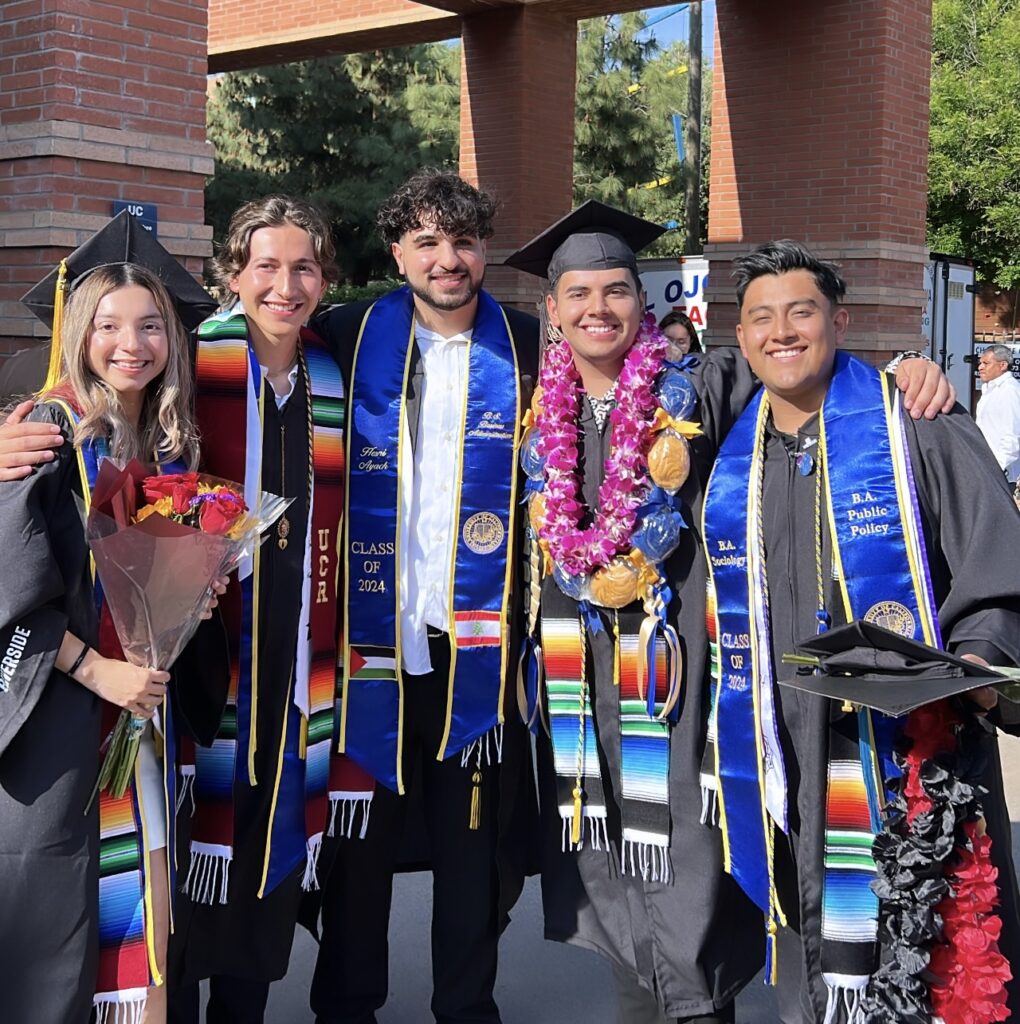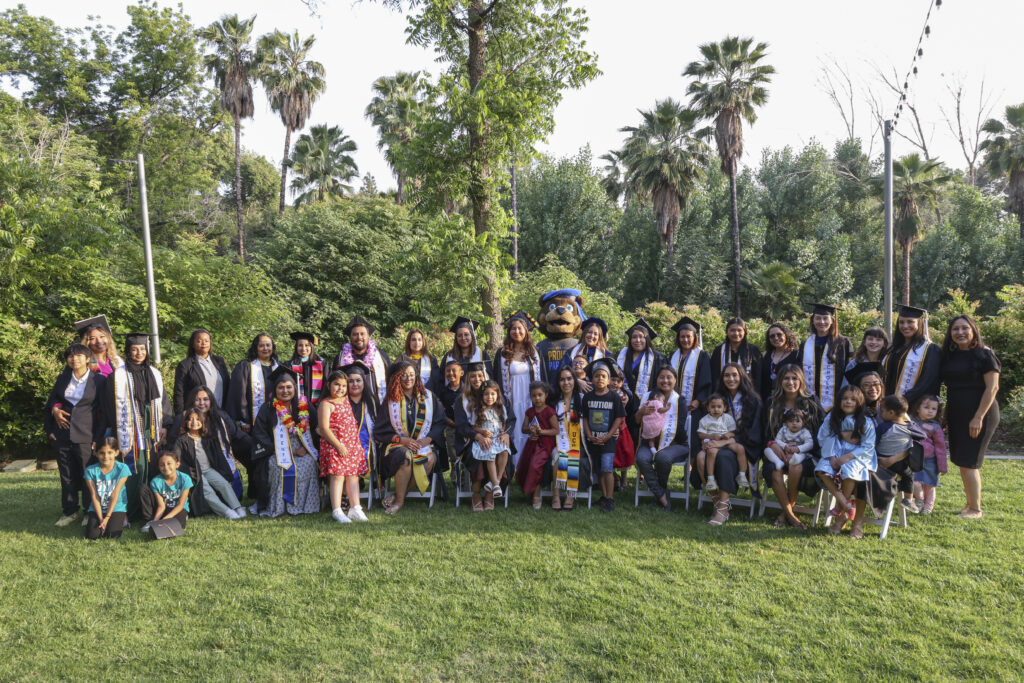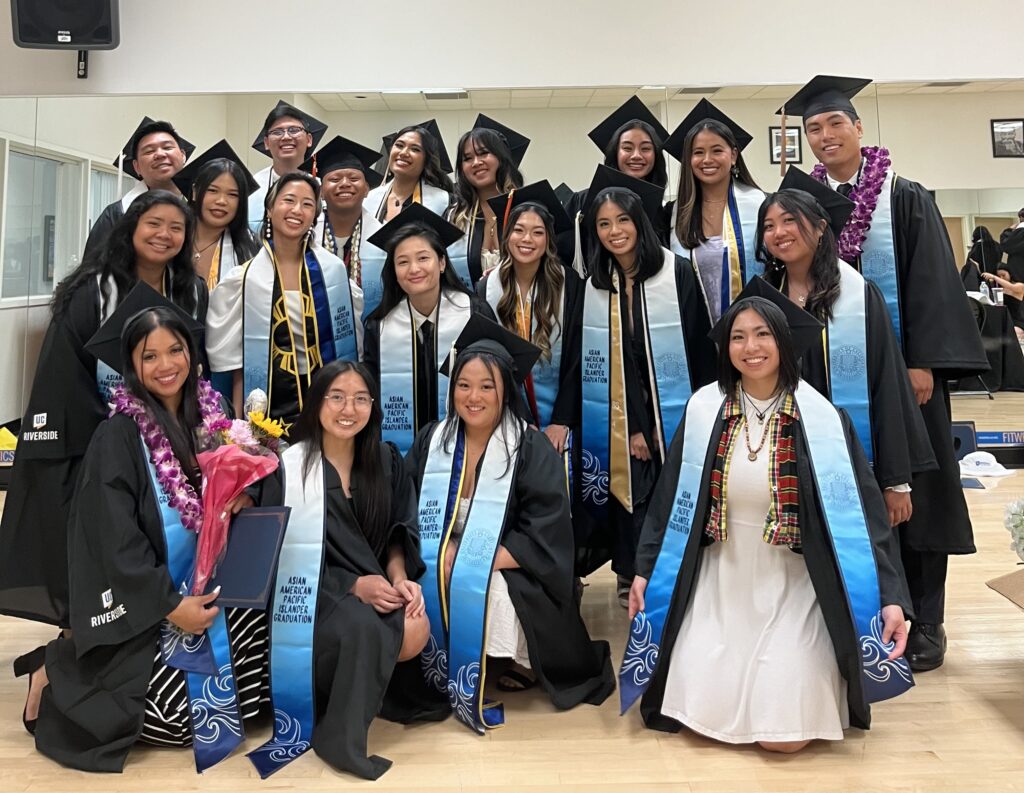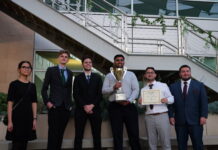As the University of California, Riverside (UCR) enters graduation season, Costo Hall prepares to celebrate the seniors who have helped enrich the various affinity spaces that support diversity on campus. Since its opening in 1954, the University of California, Riverside (UCR) has been home to a diverse student body. From spaces like the LGBT Resource Center to Chicano Student Programs (CSP), the students of UCR have strived to create safe environments and resources for their communities as they learn and grow during their time as a student.

Seniors celebrating after Chicano Student Programs Raza Grad on June 2, 2024.
CSP Student intern and senior majoring in psychology, Tina De Los Santos, expressed how this program has positively influenced her time at UCR. She shared that at Raza Grad, students are allowed to bring two family members to walk across the stage together and that “parental figures … share [the graduation] with you” so they can feel that their “sacrifices were important.” Not only does the graduate feel a sense of belonging and accomplishment, but this milestone also stands as a catalyst for younger generations to begin to “see themselves [graduating college].” These affinity spaces have become a way for students who find themselves in these cultural spaces to take a step back and appreciate the familial support that has brought them to this moment.
This view was also shared by the Director of the Women’s Resource Center (WRC), Nina Ruedas, who explained that their Student-Parent Program’s graduation ceremony allows students to thank their families as “the family has contributed to this degree in many ways too.” It creates a family friendly environment for students and their families to talk, eat and celebrate their graduate’s achievements.
Bringing both her culture and identity into perspective, Asian Pacific Student Programs (APSP) student coordinator and graduating senior, Chayenne Ofo-Ob credits “heritage and the community” for “push[ing] [students] to be in [the] position to get a degree.” She emphasizes that the “identities and the achievements that [students] … and who [they] stand for, should be recognized and uplifted.”

The 2023 Student Parent Scholar’s Graduation Ceremony that celebrated graduates with families.
Similarly, African Student Programs (ASP), which was established in 1972 has acted as a hub for Black scholars for the past 52 years at UCR, emulates a similar feeling in their graduation ceremonies. To Aliyah Kargbo, student assistant and upcoming graduate, a specialized graduation allows students to celebrate and recognize their culture.
“Celebrating in the form of dances or calls and chants,” Kargbo believes that a specialized graduation is where students and their families can “feel comfortable enough” to express themselves “in [their] own space.”
Another topic that was present was self-discovery and growth within one’s community. While they do not have an official graduation for the entirety of the WRC, Alyssa Monroy, fourth year cellular molecular developmental biology major, explained that after Covid-19 the WRC allowed her to find a sense of community that “empowered her to step out of her comfort zone” and pursue her goals. Multiple interns and student assistants also expressed how being a part of these affinity spaces allowed them opportunities to host programs such as Women’s History Month Trivia night. and Día de la Mujer, which helped them extend space to others within the community, as well as build confidence.
Similarly, the LGBT Resource Center Lavender Ceremony seeks to celebrate the accomplishments of students who have shown leadership and served LGBTQ+ community on campus. Formerly known as the Lambda Awards at UCR the ceremony was renamed to “Lavender Ceremony,” a title similar to what is used nationally for LGBTQ+ graduation ceremonies.
Nancy Tubbs, Director of the LGBT Resource Center explains this tradition regardless of its name, is a longstanding tradition at UCR. “The Lambda Celebration was formalized around 2000 as a community-building event to recognize Lambda Awards honorees, those minoring in Queer Studies and all graduating students who feel an affinity for the LGBTQ+ community.” This year’s keynote speaker was UCR alumni Shakina Nayfack, American transgender actress who founded UCR’s Drag Ball and returned this past April to host its 20-year anniversary.

The class of 2024 students decorated in their custom stoles gathered to take pictures together for the first annual AAPI Graduation on May 29, 2024.
Most of the programs gave smaller tokens to their graduates, such as custom stoles for their graduates to highlight their student’s on the commencement stage. One of the newer additions being APSP’s custom blue stoles to match their “Make Waves for AAPI Heritage Month” theme. Beyond the accolades and representation, APSP senior Ofo-Ob expressed that she is “super excited for the stoles.”
Second year sociology and general theater digital production major Karla Vicente specifically mentions that at the Undocumented Student Programs (USP) graduation brunch, she is excited to see caps, gowns and stoles are passed out. Despite not graduating this year, Vicente explained how even the mundane day to day moments within the center help build a sense of community as everyone comes together despite ethnicity or culture, “it just demonstrates how everyone comes together. We have different groups of different ethnicities, cultures and countries.”







